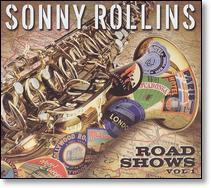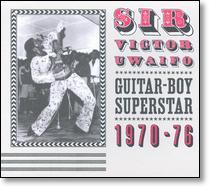A Consumer Guide to the Trailing Edge: January, 2009
Recycled Goods (#61)
by Tom Hull
 |
 |
After a surprisingly robust December showing -- 34 titles, pumped up a bit by deconstructing the Anthony Braxton box -- the record count has collapsed this month to 10, the second lowest ever. As with the lowest month, October 2008, the reason is massive distraction: back then I was working on my late father-in-law's house in Michigan; this time I've been working on my own house. In fact, I was so out of it I didn't recall that I had this due until a full week into February.
Delmark: 55 Years of Jazz (1944-2007 [2008], Delmark, CD+DVD): Bob Koester is still in charge 55 years after founding this estimable Chicago label, known more for its renowned blues catalog than for its underrated, and rather scattered, jazz efforts. The CD picks interesting if not all that representative material, with some archives -- Coleman Hawkins' early bebop from Rainbow Mist -- and a mix of interests: trad jazz from George Lewis and Art Hodes; honking r&b from King Curtis; an early adventure by Sun Ra; a vocal by Francine Griffin; some quasi-mainstream hard bop; stray excursions into pan-Africanism; a groove piece from Ted Sirota's otherwise further out Breeding Resistance. Nothing pushes you very hard -- don't look for Anthony Braxton's For Alto, or Muhal Richard Abrams, Roscoe Mitchell, or Ken Vandermark, all facets of Delmark's history. The DVD has less to choose from: the dates there range from 2004-07 and they hold less interest, mostly bare concert shots, sometimes with cheap effects -- Kahil El'Zabar's Ritual Trio with guest Billy Bang is the exception, a much better showing for Ari Brown than his own date; a 15:30 excerpt from Chicago Underground Trio is compelling musically, but unwatchable. B+
Herbie Hancock: Then and Now: The Definitive Herbie Hancock (1964-2008 [2008], Verve): This could have been programmed by an accountant: two title cuts from classic Blue Notes; an obvious title from Fat Albert Rotunda; two cuts from the bestselling Head Hunters; the overwrought Stevie Wonder turn from Gershwin's World (on a song by W.C. Handy -- what was that doing there?); a piece from the Round Midnight soundtrack (Hancock did a nice bit of acting there); two takes of "River," the bonus with Joni Mitchell as herself; a Nirvana song from The New Standard; a Billie Holiday song from the Starbucks vanity plate album Possibilities, with Damien Rice and Lisa Hannigan; a cheaper live take of "Rockit" from a stray DVD. This does indeed span Hancock's career, from hard bop to funk to fusion to cashing in and coasting. His later material fares poorly, and the fusion hasn't aged very well -- although "Rockit" is still a hoot. But the first cut thrilled me as much as ever: I finally got to this album the day Freddie Hubbard died, and there he was, unmistakably brilliant, playing with four-fifths of the Miles Davis Quintet and easily displacing the leader. The album, Maiden Voyage, is still brilliant. Start there and you'll never want to go here. B
Sonny Rollins: Road Shows Vol. 1 (1980-2007 [2008], Doxy/Emarcy): Previously unreleased, which got this classified as a new release for the Village Voice's jazz critics poll, which it won handily. However, with only three recent 2006-07 cuts, mixed with two from 1980, one from 1986, and one from 2000, the Jazz Times poll filed it under "Historical/Reissues," which it also won. I don't have a problem classifying it either way. The strongest argument that it fits under "Historical" is the Vol. 1 in the title. On the other hand, all seven cuts sound remarkably connected, even though they were picked from seven different venues, with two pianists, three bassists, five drummers, and scattered extras, like Clifton Anderson on trombone (four cuts) and Bobby Broom on guitar (three cuts). Obviously, they've done some extreme cherry picking in putting this together, but Rollins has never been a team player: no one in the last fifty years so completely dominates whatever group he finds himself in. A-
Teenage Jesus & the Jerks: Beirut Slump (1977-79 [2008], Atavistic): No Wave, the last desperate surge of would be avant-gardists to find some form of outrage beyond where anyone had gone before -- épater les punks. Lydia Lunch's group wasn't the best of the bunch -- their betters, like DNA or the Contortions, wimped out by finding music in the noise -- but they made archetypal rant and roll. A few singles, a couple of EPs, the inevitable Live at Max's Kansas City, some shit nobody bothered to release before -- it's all here, more than anyone needs. Graded leniently, because I was there, lived through it, survived, and find the memoir quaintly charming. You'll probably hate it, and not appreciate that that's the point. B+
Sir Victor Uwaifo: Guitar-Boy Superstar 1970-76 (1970-76 [2008], Soundway): Born 1941 in Benin, built his first guitar at age 12, had Nigerian hits in the 1960s and continues a long career distinguished in more than music. I first ran into Uwaifo on old Nigerian compilations, inconspicuous filler between the Kings and Princes, but his more plebian name stuck in my mind. Always wanted to find a whole compilation, but they've proven elusive until now, so this is especially welcome. Concentrating on what was likely his prime, this brings back a golden age in Nigerian pop, before war, dictatorship, and oil ground Africa's most populous nation into the dust. A-
Briefly Noted
Ablaye Cissoko/Volker Goetze: Sira (2007 [2008], ObliqSound): A Senegalese griot, Cissoko plays kora delicately and sings serenely; Goetze caresses the melodies with his trumpet, adding a warm, burnished glow. B+
Gilfema: Gilfema + 2 (2008, ObliqSound): Guitarist Lionel Loueke, native of Benin and denizen of New York, conjures up relatively bland Afropop with jazz legs -- the leader's sweet guitar far outstretches his slick vocals, and guest clarinetists Anat Cohen and John Ellis can pick up a groove and run with it. B+
The Klez Dispensers: Say You'll Understand (2008, TKD): New Jersey freylekhs, playing Yiddish trad music for sadness, for laughs, and as a springboard into jazz, starting with the "Ray Charleston." B+
Samba Meets Boogie Woogie (2008, Adventure Music): An ad hoc group, with guitarist Mario Adnet the probable leader, a half dozen vocalists named on the cover, and a strong set of Rio de Janeiro studio pros, none with any obvious expertise in boogie woogie; so no surprise that samba predominates, or that it reduces the concept to cute and clever -- that it starts to win you over is the real surprise. B+
Harry Whitaker: One Who Sees All Things (1981-82 [2008], Smalls): An obscure bebop pianist, rarely recorded, making ends meet working with acts that never really fit, hooks up with a sympathetic label allowing him to delve into old tapes that once were merely weird but now are full of historical portent; with Gary Bartz and Terumasa Hino reconceiving Bird and Diz as bebopping black power radicals. B+
Additional Consumer News
Notes
Copyright © 2009 Tom Hull.